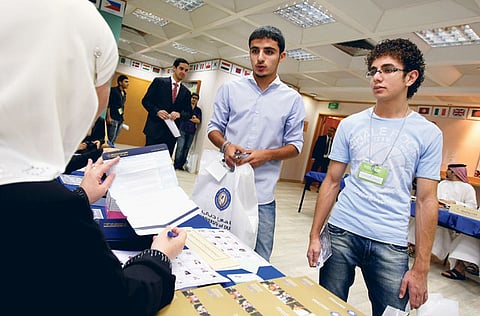University fees remain stable
At the start of the new academic year varsities skip fee hikes and report a spike in enrolment

Students now have one less thing to worry about as tuition fees for universities and colleges across the country remain stable, without increases at the start of the academic year.
Unlike previous years, a majority of students will not feel a deepening hole in their pockets due to the rising cost of their university education.
However, almost all institutions contacted by Campus Notes reported an increase or expected increase of student enrolment.
"Our total enrolment numbers have doubled compared to the previous academic year," said Professor John Grainger, Pro-Vice Chancellor of Murdoch University's Dubai International Study Centre (MU).
"We are experiencing steady and sustainable growth in enrolment for all our existing undergraduate and postgraduate offerings," he added.
The American University of Sharjah's (AUS) student body is expected to reach just under 5,500 this semester with an intake of 1,100 new students, and an addition of 17 new faculty members.
Institutions such as AUS increased their fees late last year in order to keep them steady this year. "We [AUS] already introduced a slight tuition [fee] increase in November 2009, so we aren't going to increase it again this year," said Ali Shuhaimy, Vice-Chancellor of Enrolment Management. "We try to hold the fees as steady as we can."
Marginal increase
He added that although the institution increased tuition fees once in a while it also substantially increased its financial aid. This year, AUS is offering Dh72 million in financial aid, which benefited 45 per cent of its students.
One institution, seemingly one of few, to have raised its tuition fees this year is Abu Dhabi University (ADU). However, it only went up by a small percentage.
"This year we have made a modest increase in our fees somewhere in the order of five per cent," said Dr Nabeel Ebrahim, Chancellor of ADU. "Although our fees are probably one of the lowest in comparison to other private institutions," he added.
In terms of fees, Ebrahim said, ADU ranked among the lowest 25 per cent compared to other private universities in the UAE. It charges anywhere between Dh32,000 and Dh35,000 a year for a bachelor's degree. Shuhaimy said that AUS charges an average of Dh72,000 for a bachelor's degree.
Ebrahim said ADU did expect to continue to increase fees in the coming years, in line with its growth. "We have been growing at a rate of 13 per cent per year and we expect to continue to increase tuition," he said.
However, ADU's fee increase comes much later than its counterparts. "In 2008 most private universities raised their tuition fees about 10 to 15 per cent and ADU didn't," said Ebrahim. "Again last year some institutions also significantly raised their fees," he added.
He said that was probably why most institutions had given fee increases a miss this year — not due to the economic downturn. "Most universities have increased their fees in previous years, so historically they have increased it enough, which is probably the reason they haven't raised it this year," he said. "I think it unlikely that no tuition increase was caused by the global economic situation, although it may be a factor but not the only one," added Ebrahim.
Guaranteed fixed fee
Some institutions, such as Middlesex University Dubai (MUD) guaranteed their students a fixed fee for the entire duration of their study. "We have commitment to our students that we will not change their fee structure during the duration of their studies, as long as they maintain continuous enrolment and graduate within the normal duration of the programme," said Marketing Manager Wassim Hamadah. He added that MUD had not increased it fees for programmes or services for the past three years.
Other institutions said they would not increase their fees until they were forced to do so. "We will increase our fees if I find we are can't cover our expenses," said Dr Omar Hefni, President of the University of Dubai. "Other than that there is no need, because we are not a profit-making organisation," he added.
One reason for fee stability and increasing student numbers may be due to a collective expansion of institutional offerings.
MU, for example, said it had plans to expand its degree offerings into the information technology, environmental management and sustainable development fields this academic year, as well as introduce new postgraduate degrees in education early next year.
American College of Dubai (ACD) president William O'Brien said the college's recently accredited Bachelor of Business Administration (BBA) programme was gaining traction among students. "The evening BBA programme is popular with working adults who seek to upgrade their skills and qualifications while keeping their jobs," said O'Brien.
Aviation engineering
The Emirates Aviation College reported its newly introduced higher diploma in aircraft maintenance engineering was gaining in popularity after its MBA in aviation management.
Meanwhile Ajman's Gulf Medical University said it was kicking off the academic year with two new Master's programmes — one in toxicology and another in public health. Executive educational institutions such as Cass Business School Dubai have maintained their fees at almost £30,000 (Dh168,000) for two years but say they are now looking to expand their offerings.
"The next level for us would be to develop our executive education into tailor-made programmes for different institutions," said Ehsan Razavizadeh, Head of Representative Office. "The reason being that we feel we can do more and there is a good market for it here in Dubai," he added.


